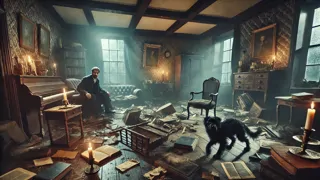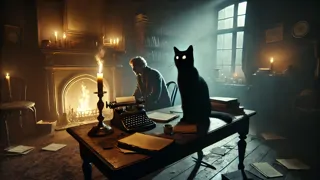Introduction
The night was thick with a suffocating stillness as Jonathan Whitaker sat alone in his study, the dying embers of the hearth casting long, jittering shadows along the walls. Each tick of the old brass clock on the mantle hammered at his temples like a distant, accusing drum. He could almost hear his own heartbeat echoing through the silent room. His eyes, bloodshot from hours of sleepless torment, focused on the dark shape curled at his feet: Pluto, the jet-black cat who had been his companion since childhood. Until tonight. Jonathan’s hand trembled as he reached down, recalling with horror the furious blow he had struck earlier. The memory pained him more than the leftover sting on his knuckles. Why had he lashed out at the creature who never failed to offer him solace in the bleak hours of his despair? His breath caught. Guilt settled in his chest like a weight he could not lift. Outside, the wind moaned against the windowpanes, carrying with it a sense of dread that Jonathan could not shake. A black cat, feathers of darkness glinting in the moonlight, had always been seen as an omen of bad luck, superstition he’d once scoffed at. Now, after what he’d done, superstition seemed a mercy compared to the guilt that bore down on him. He wrapped his arms tighter around himself, shivering. Every corner of the room held the memory of Pluto’s presence: the scratches on the leather chair, the faint trace of fur in the lamp’s soft glow, the gentle rumble of contentment whenever the cat had pressed against Jonathan’s legs. He’d destroyed all that with one careless, rage-fueled act. A soft, plaintive meow broke the oppressive hush. His heart leapt. Pluto was now nowhere in sight. Jonathan stood, unsteady on his feet, and searched the darkened room. A fresh wave of panic rose in his throat, choking him. The meow sounded again, nearer this time—and it did not belong to the cat at his feet, but to a second, unfamiliar feline he had never owned. One he had never seen until a moment ago, yet somehow knew by sight. The sleek creature with luminescent yellow eyes regarded him from the edge of the desk, its gaze a mirror of judgment and cold assurance. Jonathan’s blood ran ice-cold. His mind raced with superstition and dread. This was no ordinary cat. He stepped back, knocking his chair over with a crash that reverberated through the emptiness. The cat let out a low, haunting cry, as if echoing the voice of accusation in his own soul. Jonathan fled, the darkness swallowing him as he ran from the study—and from a guilt that no amount of denial could ever banish.
I. The Descent into Darkness
Jonathan’s household once was a sanctuary of order and muted, comforting routines. Every tick of the grandfather clock in the hallway, every carefully placed book on the shelf, every warm glow of the hearth was a testament to his careful stewardship. Pluto, tireless sentinel of the household, assumed his place on Jonathan’s lap while he worked late into the night. But as days grew shorter and worries multiplied, the steady hum of Jonathan’s life splintered into sharp, jangling fragments. Shadows pooled in corners, the wind’s hollow whisper through the chimney sounded like mockery, and every small noise—a floorboard’s creak, a candle’s sputter—felt like a threat. One evening, after a particularly bruising quarrel with an insolent business associate, Jonathan returned home in a foul mood. He cast Pluto aside in a fit of temper, struck too hard, and watched in horror as the cat’s eyes widened with pain. The moment his fist connected, a terrible shift occurred in Jonathan’s chest. Hatred flared, then remorse surged like a wave threatening to drown him. That night, sleep abandoned him completely. He paced the halls, eyes bloodshot, mind racing. Each time he closed his eyes, he saw Pluto’s look: shock, betrayal, a trust forever shattered. And he heard a new sound—a faint mewing that was not the cat’s. In the darkest hours, he felt watched. Something moved beyond his peripheral vision, a sleek darkness that evaded direct view. Once, gathering the courage to shine his candle, he saw two glowing eyes reflecting back at him from the staircase. His heart thundered in his ears. He called out, voice trembling, but no cat answered. He raced up the stairs to check Pluto’s room, finding it empty—save for a single, large scratch gouged deep into the doorframe, as if something clawed to gain entrance, or to claim its prize. He would later swear he saw black fur caught in the splintered wood. The next morning, the household staff discovered the study in disarray: overturned chair, broken candle, a smear of dark fur on the rug, and a single pawprint pressed into the spent embers by the fireplace. Yet Pluto had vanished without a trace. Jonathan’s guilt rotted away at his sanity, and whispers began to slip through his mind: Was it Pluto’s spirit? Or something more sinister? He avoided the study for days, leaving lanterns lit in every corridor, but the disquiet only grew. Shadows moved with intent; cold drafts brushed his nape. One by one, household items turned up missing, only to reappear in grotesque tableaux—Pluto’s collar dangled from the doorknob, its bell twisted shut; his favorite slippers were found arranged beneath the dining table in a circle, an echo of some infernal ritual. Each time, the sense of being watched intensified until he could no longer bear the weight of his own remorse. His nights dissolved into feverish nightmares: the black cat’s cold stare, the scratch of claws on his skin, the sorrowful yet reproachful mew that would not allow him peace. Jonathan grew gaunt and hollow-eyed. He began talking to himself, convulsively checking every room, every fireplace grate. While he wrestled with the chains of guilt that he forged himself, the vengeful feline—whatever it was—drew ever closer, stalking his every instinct. This was only the beginning of a terror that would leave Jonathan teetering on the edge of madness…

Conclusion
Jonathan’s final act of desperation came one moonless night. The house lay silent, empty of staff and all signs of life except for the faint glimmer of a single candle burning in the study’s far corner. Driven by guilt and the relentless stalking of unseen claws, Jonathan crept back to that room where it all began. His heart hammered in his ears as he approached the desk, now stripped of papers and ornaments, save for Pluto’s collar, cold and untouched. There, on the hearth, lay a glowing ember: a single, accusing flame that seemed to burn with its own moral outrage. The room was thick with silence—and with something else: an almost imperceptible movement above the mantle. Jonathan’s gaze followed a curling wisp of shadow until he spied them: two luminous yellow eyes shining through the darkness. His blood ran cold. The specter of the cat reappeared, fur bristled, tail lashing in silent fury. For a moment, Jonathan felt himself drawn into those glowing orbs, forced to reckon with the betrayal he had inflicted on the creature so loyal and loving. Guilt he had feared was nothing compared to the corrosive horror of this cosmic retribution. As he stood frozen, the candle sputtered, and the embers leapt. The room exploded in a cascade of sparks as the shutters banged open, and a wind howled through the study. The cat leapt down, landing behind the desk, and Jonathan, driven beyond reason, lunged forward to silence the accusation once and for all. But the weight of his own fear and guilt turned his hand against himself: he tripped over the fallen carpet, stumbled into the hearth, and felt the hot coals sear his skin. He cried out, and in that moment, the cat appeared before him, unscathed, its eyes reflecting neither malice nor triumph, but only sorrow. The final thing Jonathan saw before passing out was the feline’s soft paw lifting a glowing ember and setting it on his chest. When the servants found him at dawn, they discovered only a pile of ashes in the hearth and the charred remains of his study. No body, no trace of Pluto—only the collar, perched upright on a broken chair, blackened and scorched. From that day on, the old Whitaker mansion was said to be haunted by the soft, mournful mew of a black cat, a reminder that cruelty never goes unpunished, and that some bonds, once broken, demand a debt that can never be paid in full.


















